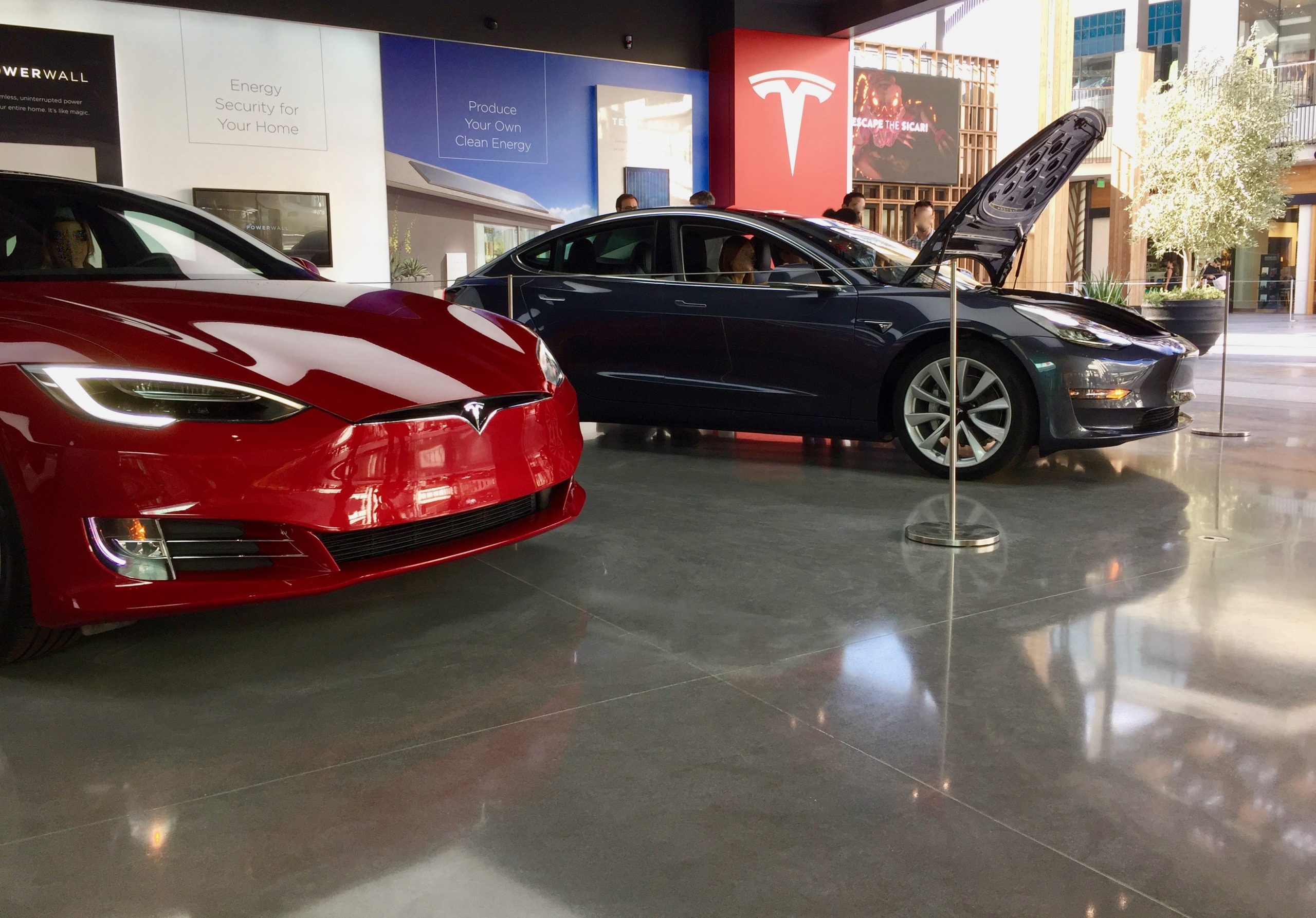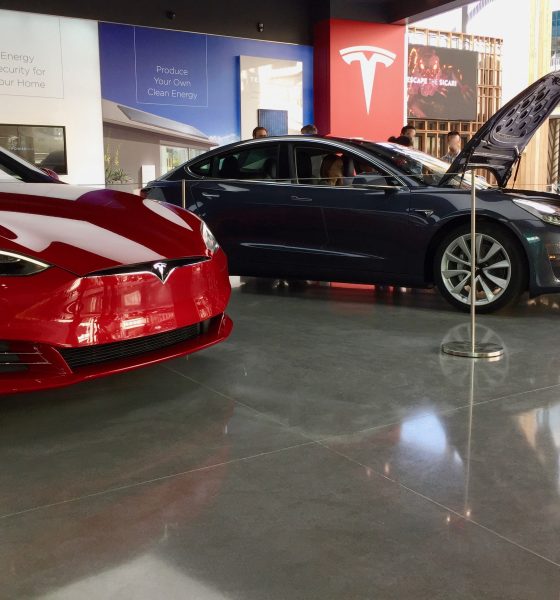

News
Tesla direct sales in New Mexico gains ground as “Tesla Bill” gets approved
A piece of New Mexico state legislation to amend local automotive franchise laws through a “Tesla Bill”, specifically allowing vehicle manufacturers like Tesla to operate as a dealer and sell direct, was approved by the Public Affairs Committee last Thursday.
Similar to other states with dealership protections, car makers wanting to do business in the “Land of Enchantment” must sell their vehicles through a franchise dealership network, and efforts to amend those requirements are always met with significant resistance from lobbyist groups whose members stand to be impacted most. After facing a party-line vote, Democrats ‘for’ and Republicans ‘against’, the law (Senate Bill 243) passed the state’s Public Affairs Committee and advanced to the Corporations and Transportation Committee. After another review and vote, the bill will advance to the Senate floor for a final vote if successful. Given the state’s balance of power – Democrats are in the majority in both houses of the state’s legislature as well as the governorship – Tesla may be well on its way to a full victory in New Mexico.
Prior to the Public Affairs Committee vote, a panel was held wherein advocates both for and against amending the state franchise laws voiced their positions. Overall, supporters (particularly those focused on Tesla’s desire to do business in the state) argued that the bill in question aims to work within the dealership model, not eliminate it. According to Meredith Roberts, senior policy adviser and counsel representing Tesla, “We’re not here to upset (the franchise model)…It’s only additive,” she said in the panel hearing. The language of the bill supports this position via its narrow applicability, allowing direct sales only if the following conditions apply:
- The business does not have any existing franchises in the state.
- The business sells and services only vehicles that it manufactures.
- The vehicles sold must be electric and powered by batteries or fuel cells.

Despite the estimated $4800 tax income New Mexico would gain per average electric vehicle sold, 15-50 new jobs per store opened, and $1 million dollars local economic impact gain from a direct-sales manufacturer like Tesla would bring to the state, those in opposition to the bill maintained that changes to the existing franchise laws would not be beneficial. During the hearing, Charles Henson, president of the New Mexico Automotive Dealers Association, cited the millions of dollars already invested by dealerships, arguing that Tesla’s sales model would create unfair direct manufacturer competition. Another state senator, Jacob Candelaria (D-Albuquerque), likened EV manufacturers’ direct-sales models to giant tech company monopolies. To be fair, with the popularity of the direct-sales model increasing, as all-electric fleets come into being (a stated goal of many current ICE vehicle makers), franchises may end up becoming a thing of the past as the future of clean energy transportation sets in.
While the hand-off from one committee to another is a good step towards the end goal of in-state, brick-and-mortar sales presence for EV manufacturers, the bill still may face an uphill battle despite the political leanings of the state’s legislative majority for reasons outside lobbyist efforts. Specifically, some legislators are a bit put-off by Tesla’s history in New Mexico. A manufacturing plant was announced in 2007 (to be succeeded by the current Fremont factory) and a Gigafactory was teased in 2014 (to be succeeded by the current Sparks, Nevada factory). Since neither of those projects came to fruition within the state, it seems there may be some leftover sour grapes. However, given Tesla’s current inability to do normal sales business in New Mexico, it’s understandable that the all-electric car maker may have based part of their location decisions on their customers’ purchasing abilities in the states where they set up shop, thereby limiting potential liabilities and run-ins with dealership groups. This is something Volvo USA is already experiencing with its company-directed vehicle subscription service.
At this juncture, Tesla is all too familiar with the franchise vs. direct-sales fight. In December last year, a Connecticut judge ruled in favor of Connecticut’s Department of Motor Vehicles on a motion prompted by the Connecticut Automotive Retailers Trade Association (CARA), finding that Tesla’s business activities within the state violated the states automotive franchise law system. The EV company only had one location in the state – a gallery located in Greenwich to inform interested parties about its products, not sell them – but even that was determined to constitute competition and thus banned activity. Legislative efforts to amend Connecticut’s laws by state representatives in favor of Tesla’s sales approach have, thus far, failed. Ironically, Connecticut is also controlled by Democrats in both the legislature and governorship.

Cybertruck
Tesla drops latest hint that new Cybertruck trim is selling like hotcakes
According to Tesla’s Online Design Studio, the new All-Wheel-Drive Cybertruck will now be delivered in April 2027. Earlier orders are still slated for early this Summer, but orders from here on forward are now officially pushed into next year:

Tesla’s new Cybertruck offering has had its delivery date pushed back once again. This is now the second time, and deliveries for the newest orders are now pushed well into 2027.
According to Tesla’s Online Design Studio, the new All-Wheel-Drive Cybertruck will now be delivered in April 2027. Earlier orders are still slated for early this Summer, but orders from here on forward are now officially pushed into next year:
🚨 Tesla has updated the $59,990 Cybertruck Dual Motor AWD’s estimated delivery date to April 2027.
First deliveries are still slated for June, but if you order it now, you’ll be waiting over a year.
Demand appears to be off the charts for the new Cybertruck and consumers are… pic.twitter.com/raDCCeC0zP
— TESLARATI (@Teslarati) February 26, 2026
Just three days ago, the initial delivery date of June 2026 was pushed back to early Fall, and now, that date has officially moved to April 2027.
The fact that Tesla has had to push back deliveries once again proves one of two things: either Tesla has slow production plans for the new Cybertruck trim, or demand is off the charts.
Judging by how Tesla is already planning to raise the price based on demand in just a few days, it seems like the company knows it is giving a tremendous deal on this spec of Cybertruck, and units are moving quickly.
That points more toward demand and not necessarily to slower production plans, but it is not confirmed.
Tesla Cybertruck’s newest trim will undergo massive change in ten days, Musk says
Tesla is set to hike the price on March 1, so tomorrow will be the final day to grab the new Cybertruck trim for just $59,990.
It features:
- Dual Motor AWD w/ est. 325 mi of range
- Powered tonneau cover
- Bed outlets (2x 120V + 1x 240V) & Powershare capability
- Coil springs w/ adaptive damping
- Heated first-row seats w/ textile material that is easy to clean
- Steer-by-wire & Four Wheel Steering
- 6’ x 4’ composite bed
- Towing capacity of up to 7,500 lbs
- Powered frunk
Interestingly, the price offering is fairly close to what Tesla unveiled back in late 2019.
Elon Musk
Elon Musk outlines plan for first Starship tower catch attempt
Musk confirmed that Starship V3 Ship 1 (SN1) is headed for ground tests and expressed strong confidence in the updated vehicle design.

Elon Musk has clarified when SpaceX will first attempt to catch Starship’s upper stage with its launch tower. The CEO’s update provides the clearest teaser yet for the spacecraft’s recovery roadmap.
Musk shared the details in recent posts on X. In his initial post, Musk confirmed that Starship V3 Ship 1 (SN1) is headed for ground tests and expressed strong confidence in the updated vehicle design.
“Starship V3 SN1 headed for ground tests. I am highly confident that the V3 design will achieve full reusability,” Musk wrote.
In a follow-up post, Musk addressed when SpaceX would attempt to catch the upper stage using the launch tower’s robotic arms.
“Should note that SpaceX will only try to catch the ship with the tower after two perfect soft landings in the ocean. The risk of the ship breaking up over land needs to be very low,” Musk clarified.
His remarks suggest that SpaceX is deliberately reducing risk before attempting a tower catch of Starship’s upper stage. Such a milestone would mark a major step towards the full reuse of the Starship system.
SpaceX is currently targeting the first Starship V3 flight of 2026 this coming March. The spacecraft’s V3 iteration is widely viewed as a key milestone in SpaceX’s long-term strategy to make Starship fully reusable.
Starship V3 features a number of key upgrades over its previous iterations. The vehicle is equipped with SpaceX’s Raptor V3 engines, which are designed to deliver significantly higher thrust than earlier versions while reducing cost and weight.
The V3 design is also expected to be optimized for manufacturability, a critical step if SpaceX intends to scale the spacecraft’s production toward frequent launches for Starlink, lunar missions, and eventually Mars.
News
Tesla FSD (Supervised) could be approved in the Netherlands next month: Musk
Musk shared the update during a recent interview at Giga Berlin.

Tesla CEO Elon Musk shared that Full Self-Driving (FSD) could receive regulatory approval in the Netherlands as soon as March 20, potentially marking a major step forward for Tesla’s advanced driver-assistance rollout in Europe.
Musk shared the update during a recent interview at Giga Berlin, noting that the date was provided by local authorities.
“Tesla has the most advanced real-world AI, and hopefully, it will be approved soon in Europe. We’re told by the authorities that March 20th, it’ll be approved in the Netherlands,’ what I was told,” Musk stated.
“Hopefully, that date remains the same. But I think people in Europe are going to be pretty blown away by how good the Tesla car AI is in being able to drive.”
Tesla’s FSD system relies on vision-based neural networks trained on real-world driving data, allowing vehicles to navigate using cameras and AI rather than traditional sensor-heavy solutions.
The performance of FSD Supervised has so far been impressive. As per Tesla’s safety report, Full Self-Driving Supervised has already traveled 8.3 billion miles. So far, vehicles operating with FSD Supervised engaged recorded one major collision every 5,300,676 miles.
In comparison, Teslas driven manually with Active Safety systems recorded one major collision every 2,175,763 miles, while Teslas driven manually without Active Safety recorded one major collision every 855,132 miles. The U.S. average during the same period was one major collision every 660,164 miles.
If approval is granted on March 20, the Netherlands could become the first European market to greenlight Tesla’s latest supervised FSD (Supervised) software under updated regulatory frameworks. Tesla has been working to secure expanded FSD access across Europe, where regulatory standards differ significantly from those in the United States. Approval in the Netherlands would likely serve as a foundation for broader EU adoption, though additional country-level clearances may still be required.








